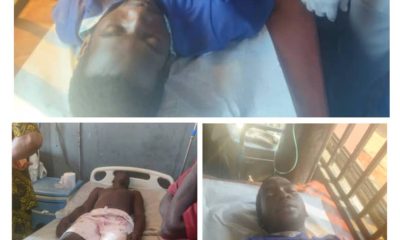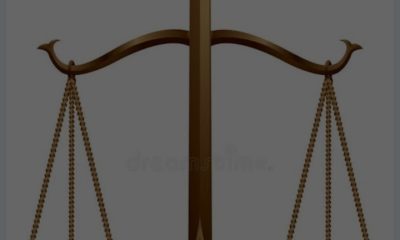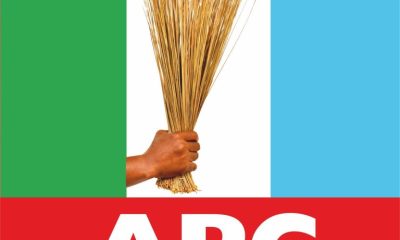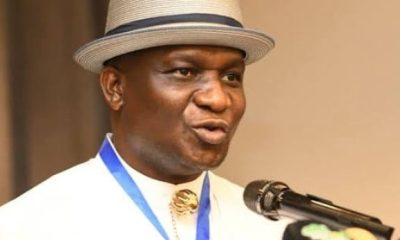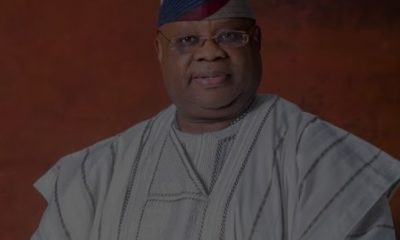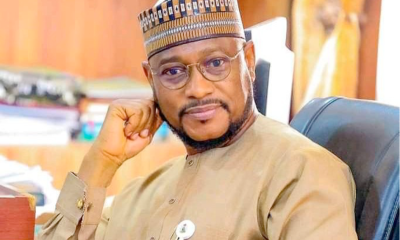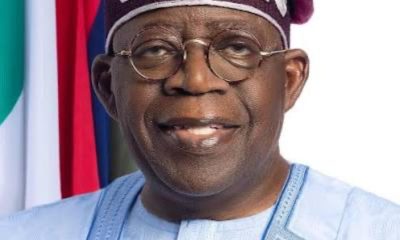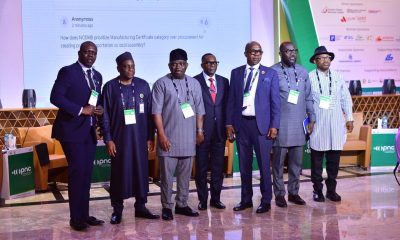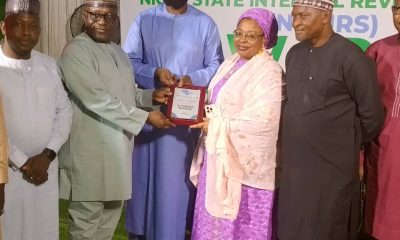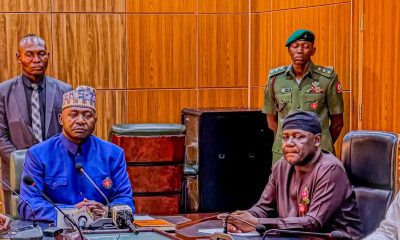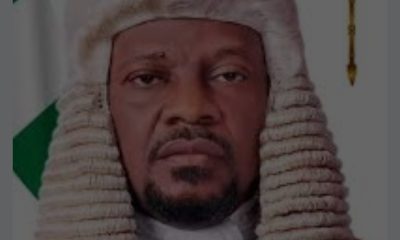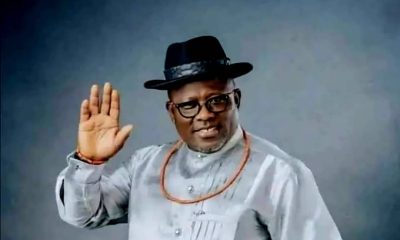Politics
APC slams Tambuwal, accuse him of misleading opposition members against Tinubu
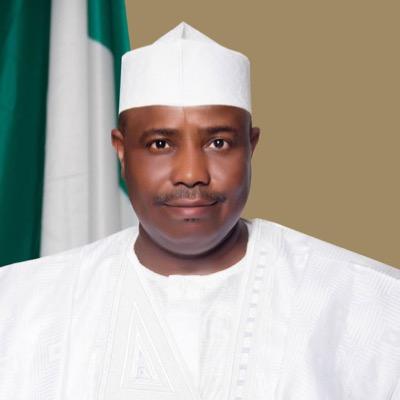
By Our Correspondent
In a build-up to 2027 general election, the ruling All Progressives Congress (APC) has accused the former Speaker of the House of Representatives, and former Governor of Sokoto State, Alhaji Aminu Waziri Tambuwal, for repeatedly hurling “foul allegations against President Bola Ahmed Tinubu and the All Progressives Congress (APC).”
The party drew a battle line with Tambuwal for claiming in a recently televised interview, that President Tinubu and APC are plotting the destabilization of opposition parties in the country, and for allegedly bragging about defeating the President and the APC in the next general election.
In a statement issued on Sunday night and signed by the National Publicity Secretary, Barrister Felix Morka said just like his garrulous opposition cohort, “Tambuwal offered no substantiation of his bogus claims but could not resist the draw to jump on the inglorious bandwagon of kindred opposition figures whose warped pastime is blind attacks on the president.”
According to the statement, “despite their inert and lackluster engagement, it is now clear to Nigerians that the present crop of opposition leaders have lost focus, assuming they ever had any, aside from their compulsive and obsessive crave for power and patronage that feed their huge ego and greed.
“Opposition politics is not simply about membership of a political party different from the ruling party. It is not just about the freedom to zap in and out of political parties based on purely selfish political calculations. It is also not about the freedom to bandy false narratives, peddle lies and engage in smear campaigns designed to sow discord and mislead the public. Opposition politics is certainly not also about weaponizing grudge disguised as opposition critiques.”
The APC said, “It is perplexing that these opposition leaders – the likes of Tambuwal, Alhaji Atiku Abubakar, Mallam Nasir El-Rufai, Mr. Peter Obi and Mr. Rotimi Amechi – who have occupied some of the highest political offices in our country have failed, horridly and disgracefully, to provide leadership, purpose, direction and vitality to their parties. Rather than focus their attention and touted leadership abilities to building viable opposition parties, they prefer to play the blame game, pointing fingers at the APC for failure that is entirely their own.
“A justification for democratic political opposition exists essentially in its role to hold the government accountable to govern in accordance with the rule of law and democratic norms. It is also about the duty of opposition leaders to take responsibility and accountability for their failure as leaders of their parties. Without effective leadership, opposition parties cannot perform their ascribed role of promoting accountability of governance or its role to provide credible policy alternatives or extending cooperation to the ruling party in pursuit of progress, and achieving the common good.
“How can anyone take present day opposition leaders seriously as capable of leading Nigeria at this high-stakes moment in our nation’s history when they have proved so grossly incapable of leading their parties?
“Tambuwal must believe that his status as an opposition politician confers some kind of immunity from investigation or prosecution by anti-corruption agencies. No member of the political opposition is above the law just like no citizen is above the law. Tambuwal’s suggestion that his recent arrest and ongoing investigation by the Economic and Financial Crimes Commission (EFCC) for alleged cash withdrawals totalling N189 billion in contravention of the Money Laundering (Prevention and Proctection) Act, 2022 indicated a politically-motivated clamp down on the opposition bellies the obscene and perverse entitlement mentality that these opposition leaders carry.”
The APC stated thst “resorting to emotional blackmail against the government as a device to shield himself or anyone from lawful scrutiny, investigation or prosecution for suspected heinous economic crimes will not and should not cut it as opposition sacred cows. To be clear, for the umpteenth time, President Tinubu and our great Party are preoccupied with the important business of governance and do not have idle time to meddle in the internal affairs of parties that are already badly broken by their own failures and internal contradictions.
“Opposition leaders remain in denial while their parties drift, rudderless at sea, as their members peel away in droves. The opposition’s attempt at building a coalition remains a figment that is not coalescing due to the hostile takeover of the African Democratic Congress (ADC) that is now unraveling in crippling dimensions, and the competing selfishness, desperation and arrogance of its leaders.
“With nothing of value to offer Nigerians, these opposition elements have now turned political prophets trumpeting their base wishes and 2027 predictions that only truly portend the devastating defeat that awaits them at the voting thumbs of the good Nigerian electorate that have rejected them before, that rejected them in the recent bye-elections, and will reject them decisively, again, come 2027.
“As a Party, we will continue to strenghten our internal democratic systems to stand stronger, and serve Nigerians better, while as a government, President Tinubu remains resolute and focused on rebuilding generationally neglected foundations of our economic life and repositioning the country for sustainable progress,” the statement concluded.
Politics
Rivers Assembly Speaker, 16 others dump PDP for APC
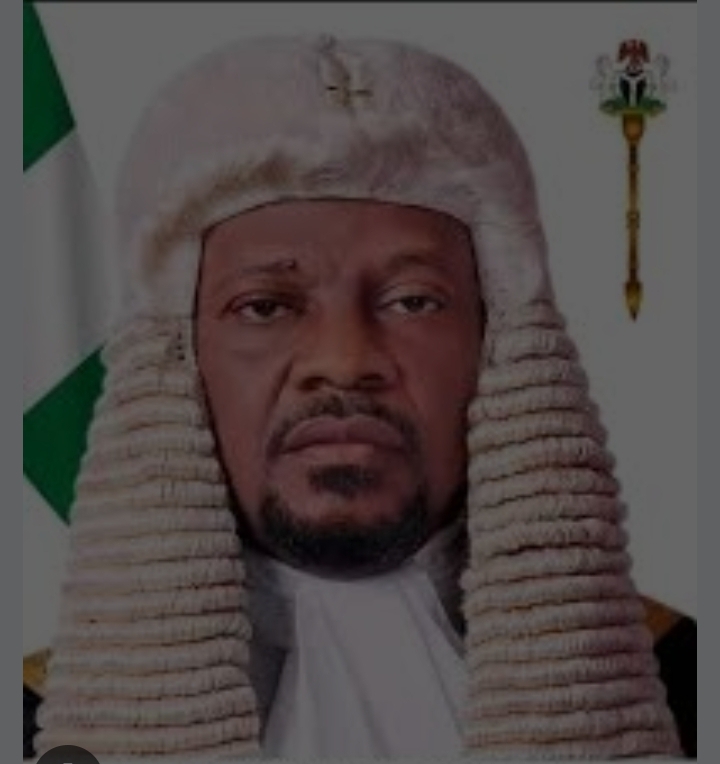
By Our Correspondent
Seventeen members of the 10th Rivers State House of Assembly, on Friday, defected from the Peoples Democratic Party (PDP) to the All Progressive Congress (APC).
The lawmakers announced their defection during plenary on Friday, December 5, 2025 at the Auditorium of the Assembly quarters currently used as the hallowed chambers.
The defected lawmakers, led by Speaker of the House, Martin Amaehwule, cited the division in the PDP at the national level as the reason for their defection, noting that the situation has made the future of the party “hazy and nebulous”.
Among the lawmakers who defected to the All Progressive Congress were; the Speaker, Martin Amaewhule, Deputy Speaker, Dumle Maol, Majority Leader, Major Jack, Deputy Majority Leader, Linda Somiari- Stewart, Chief Whip, Hon. Frankline Nwabuchi, and the Deputy Whip, Hon. Ofiks Kabang.
Others are; Hon. Peter Abbey, Smart Adoki, Igwe Aforji, Arnold Davids, Enemi George, Tekenari Granville, Christian Nwankwo, Gerald Oforji, Azeru Opara, Lolo Opuende, and Hon. Solomon Wami.
Recall that the Speaker, Martin Amaehwule had in December 2023, in the heat of the over two years political crisis in the state, led all 27 members of the Assembly loyal to the FCT Minister to the APC but later denied their defection, and returned to the PDP.
Meanwhile, the PDP which is now the minority party in the House with 9 members, has constituted their officers with Hon. Sylvanus Nwankwo emerging the Minority Leader, Hon. Barile Nwakoh was elected Deputy Minority Leader, Hon. John Dominic Iderima, Minority Whip, and Hon. Justina Emeji, Deputy Minority Whip.
The Assembly has also renewed its earlier call on the State Governor, Sir Siminalayi Fubara to forward his list of Commissioner-nominees to the House for screening and confirmation in line with the 1999 Constitution; regretting that “the State is yet to have the complement of a full cabinet.”
The Assembly also reaffirmed its earlier resolution made on the 14th of December, 2023, and adopted the auditorium at the State House of Assembly quarters as its legitimate and lawful Chamber for the conduct of legislative businesses for the life of the Tenth Assembly of the State.
Speaker of the Assembly, Martin Amaehwule in his speech lauded President Bola Tinubu for his purposeful and exceptional leadership and pledged their support to the APC and the President.
Politics
Sulu – Gambari , Ita Enang , Dambazzau , Ibas Ibok -Ete, 61 others make Tinubu’s Ambassadorial list
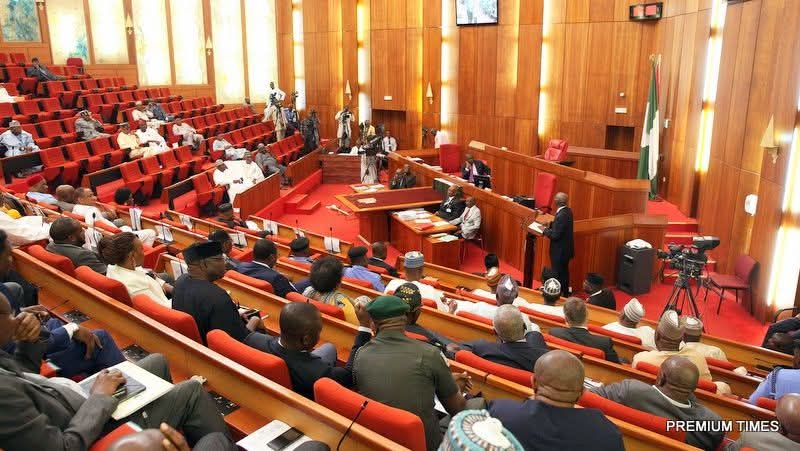
By George Mgbeleke
The Senate Thursday received requests for confirmation of nominations of 65 Ambassadorial nominees from President Bola Ahmed Tinubu.
The nominees as read from two different lists by the President of the Senate , Godswill Akpabio during plenary, fell into two categories of 34 Career Ambassadors and High Commissioners and 31 Non – Career Ambassadors and High Commissioners designate .
Notable names among the 34 Carrer Ambassadors and High Commissioners are Ambassador Sulu – Gambari Olatunji Ahmed from Kwara State , Ambassador Ahmed Mohammed Monguno from Borno State , Ambassador
Maimuna Ibrahim from Adamawa State etc .
Notable in the list of Non Career Ambassadors and High Commissioners are Senator Solomon Ita Enang from Akwa Ibom State , Vice Admiral Ibas Ibok – Ete from Cross River State , Ex Chief of Army Staff, Abdulrahaman Dambazzau from Kano etc .
President Tinubu in the requests hinged on section 171 sub section 1, 2 and 4 of the 1999 Constitution , sought for expeditious consideration of the nominees .
Accordingly, the President of the Senate, forwarded the requests to the committee on Foreign affairs for screening and report back within one week .
Recall that President Tinubu had earlier forwarded to the Senate , three ambassadorial nominees last week for appointment confirmation .
The three earlier nominees , namely
Kayode Are ( Ogun State), Aminu Dalhatu ( Jigawa) and Ayodele Oke ( Oyo State ), were screened on Wednesday by Senator Abubakar Sani Bello ( Niger North ) led committee .
Full list of the Ambassadorial nominees per state reads : ” Ambassador Ezenwa Chukwuemeka ( Abia ) Maimuna Ibrahim ( Adamawa ), Monica Ogochukwu ( Anambra) ,
Ambassador Mohammed Mahmoud Lele ( Bauchi) ,
Endoni Sindo ( Bayelsa) and Ambassador Ahmed Mohammed Minguno ( Borno ) .
Others are Jane Adams Okon Michael ( Cross River ), Clark Omeruo Alexandra ( Delta ), Chimma Geofrey Davies ( Ebonyi) ,
Oduma Yvonne Ehinose ( Edo State ), Wasa Segun Ige ( Edo State )
Ambassador Adeyemi Adebayo Emmanuel ( Ekiti ), Ambassador Onaga Ogechukwu Kingsley ( Enugu ) and
Magaji Umar ( Jigawa) .
Other nominees in the category of Career Ambassadors are
Mohammed Saidu Dahiru ( Kaduna ) ,
AbdulSalam Abus Zayat ( kano) ,
Shehu Barde ( Katsina ) , Aminu Nasiu ( Katsina ),
Abubakar Musa Musa ( Kebbi) ,Mohammed Idris ( Kebbi) ,
Bako Adamu Umar ( Kogi ) ,
Sulu Gambari Olatunji Ahmed ( Kwara ),
Ramata Mohammed ( Lagos ), Shaga John Shama ( Nasarawa )
Salau Hamza Mohammed ( Niger ) and Ibrahim Danlami ( Niger ) .
Others are
Adeola Ibrahim Mopelola ( Ogun) ,
Ruben Abimbola Samuel ( Ondo),
Akande Wahab Adekola ( Osun) ,
Adedokun Esther ( Oyo) ,
Gedagi Joseph John ( Plateau ) ,
Luther Obomode Ayokalata ( Rivers ),
Danladi Yakubu Yaku ( Taraba ) and
Bello Dogondaji ( ( Zamfara ) .
Names on the list of the 31 Non – career ambassadorial nominees are
Senator Grace Bent ( Adamawa ) , Senator Eta Enang ( Akwa – Ibom),
Nkechi Linda Okocha ( Anambra ),
Mahmud Yakubu ( Bauchi )
Philip K. Ikurusi ( Bayelsa ) ,
Paul Oga Adikwu ( Benue ),
Vice Admiral Ibok-Ette Ibas rtd ( Cross River ),
Hon. Abasi Braimah ( Edo ) and
Erelu Angela Adebayo Ekiti )
Others are Barrister Olumilua Oluwayimika Ayotunwa ( Ekiti ),
Rt. Hon. Ifeanyi Ugwuanyi ( Enugu State ) ,
Barr. Mrs. Chioma Ohakim ( Imo State ),
Lt. Gen. Abdulrahman Bello Dambazau (rtd.) ( Kano State ),
Hon. Tasiu Musa Maigari ( Katsina ) ,
Alhaji Abubakar Sanusi Aliyu ( Kogi) and
Olufemi Pedro ( Lagos State ) .
Others are
Barr. Mohammed Ubandoma Aliyu ( Nasarawa ),
Senator Jimoh Ibrahim ( Ondo), Ambassador Joseph Sola Iji ( Ondo ),
Fani-Kayode ( Osun ) , Professor O. Adewole ( Osun) , Florence Ajimobi ( Oyo ), Lola Akande ( Oyo), Professor Nora Ladi Daduut ( Plateau) , Yakubu N. Gambo ( Plateau ) , Chukwujinka Okocha ( Rivers ) , Haruna Abubakar ( Sokoto ) , Rt Hon Jerry Samuel Manwe ( Taraba ) and Adamu Garba Talba Nangree ( Yobe State ) .
Politics
Kano Guberpoll: Former LG chairmen adopt Sen Barau as APC’s sole candidate for 2027

By George Mgbeleke
Former local government chairmen in Kano State have adopted the Deputy President of the Senate, Senator Barau I. Jibrin, as the sole candidate of the All Progressives Congress (APC) for the 2027 governorship race in the state.
The former LG chairmen who served between 2019 and 2022, during the era of Dr Abdullahi Umar Ganduje as Governor of the state, adopted Senator Barau during a courtesy call to the National Assembly in Abuja on Wednesday.
A motion for the adoption of Senator Barau was moved by the former chairman of Rimin Gado Local Government Area, Barrister Dahiru Mannir Maigari, and seconded by the former chairman of the Association of Local Government of Nigeria (ALGON) in the state, Hon. Baffa Mohammed Takai.
When the former chairman of Madobi LGA, Alhaji Mohammed Yahaya, put the vote, all the former chairmen unanimously approved it through a voice vote.
Two members of the Kano State House of Assembly, Hon Zubairu Hamza Masu (Sumaila) and Hon Garba Yau Gwarmai (Tsanyawa/Ghari), witnessed the event.
A statement by the Special Adviser to the Deputy President of the Senate on Media and Publicity, Malam Ismail Mudashir, said that after the voice vote, the local government chairmen appealed to Senator Barau to declare for the governorship race as soon as possible.
Former chairman of Gwale LGA. Alhaji Khalid Ishak Diso informed the Deputy President of the Senate that the people of Kano, especially at the grassroots level, are eagerly awaiting his declaration for the race.
” Kano people are waiting for you to declare for the governorship race. We recently organised an event, where we asked you to declare. You are yet to. The people of Kano are anxiously awaiting your declaration. When are you declaring? Please answer the call to serve our people,” he said.
Also, the former Chairman of ALGON, Baffa Mohammed Takai, who led his colleagues on the courtesy call, said they adopted Senator Barau in view of his outstanding performance in parliament, adding that his contributions to Kano’s development are immense.
” We are here to throw our weight behind you. We are 100 per cent with you. Insha’Allah, you will be the next governor of Kano State, come May 29, 2027. You have the capacity to address the challenges facing our state,” he said.
Responding, the Deputy President of the Senate thanked the former local government chairmen for their support, describing them as grassroots politicians.
“It’s indeed true that Kano was second to Lagos before, in terms of development, in terms of commerce and so on. Unfortunately, Kano is now trailing behind due to a lack of good leadership. Let us not live in denial. This is a fact that we must all work together to address in the interest of our people and state.
“I wish to assure you that by the grace of God, we will take bold steps to bring Kano back to its glorious days. We will succeed by the grace of God. We will always stand by the truth and for our people,” he said.
* Tsanyawa, Ghari stakeholders endorse Barau
Meanwhile, stakeholders from Tsanyawa and Ghari LGAs of Kano State have also thrown their weight behind Senator Barau’s candidature during their visit to him on Wednesday.
A member of the Kano State House of Assembly, Hon. Garba Yau Gwarmai, representing Tsanyawa/Ghari, moved the motion, which Hon. Aminu Yakanawa seconded. A thunderous ovation from over 100 stakeholders in attendance followed the announcement of the endorsement.
Yakanawa told the Deputy President of the Senate that the people of the two local government areas are solidly behind him.
” By the grace of Allah SWT, you are the next governor of Kano State. Our people are solidly behind you, and we are committed to supporting you,” he said
Responding, Senator Barau thanked them for the support, saying the massive support from all the people of the state is a signal of what will happen in 2027.
On the security challenges facing some parts of Tsanyawa and Shanono LGAs, he said, ” We are not leaving any stone unturned in tackling this challenge. We are working underground to bring an end to it. We have taken all the necessary steps. It is not something that we go to radio stations to announce.”
-

 Business & Economy4 months ago
Business & Economy4 months agoPC-NCG Issues Disclaimer on Purported Nigerian Coast Guard National Orientation Exercise In Anambra State
-

 Entertainment1 year ago
Entertainment1 year agoJubilation galore as Parishioners of CKC Kurudu celebrate their cultural heritage ….FG should exploit our Cultural heritage to unite Nigerians-Rev Fr Dim
-

 Law & Crime6 months ago
Law & Crime6 months agoICPC pledges to collaborate with FIDA to end Sex for Marks in tertiary institutions
-

 General News1 year ago
General News1 year agoCelebration galore as UDA Successfully Elected New Exco ……I will digitalize processes that will raise UDA to greater height -Comr. Okejiri
-

 General News2 years ago
General News2 years agoReps hold public hearing on FMC Ugwuaji Awkunanaw
-

 Law & Crime5 months ago
Law & Crime5 months agoLegal practitioner raises alarm over threat to his life by CSP Muhammed Abdulkareem
-

 General News1 year ago
General News1 year agoKugbo Hill Tragedy: Trailer Crushes Car, Kills Four and Injures Several Others in Abuja
-

 Politics3 months ago
Politics3 months agoASUU-NDU protest against FG loans, unpaid salaries,Non-Implementation of agreements …..says loans is generational slavery

